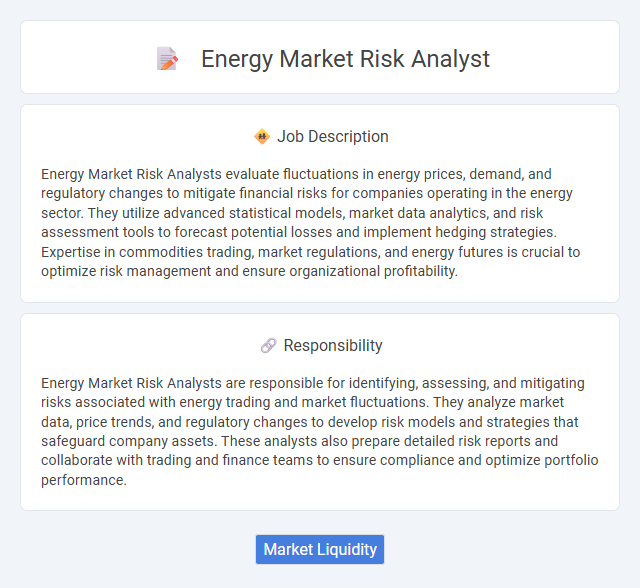
Energy Market Risk Analysts evaluate fluctuations in energy prices, demand, and regulatory changes to mitigate financial risks for companies operating in the energy sector. They utilize advanced statistical models, market data analytics, and risk assessment tools to forecast potential losses and implement hedging strategies. Expertise in commodities trading, market regulations, and energy futures is crucial to optimize risk management and ensure organizational profitability.
Individuals with strong analytical skills, a keen interest in energy markets, and the ability to assess financial risks are likely suitable for an Energy Market Risk Analyst role. Those who thrive in fast-paced environments, can interpret complex data, and make informed decisions under uncertainty may find this position rewarding. Conversely, people who prefer routine tasks or lack adaptability may face challenges in meeting the dynamic demands of this job.
Qualification
A successful Energy Market Risk Analyst typically holds a degree in finance, economics, engineering, or a related quantitative field, with strong skills in statistical analysis and risk modeling. Proficiency in programming languages such as Python, R, or SQL and familiarity with energy market trading platforms and regulatory environments enhances job performance. Experience in volatility forecasting, credit risk assessment, and developing hedging strategies is crucial for evaluating market exposures and optimizing risk management.
Responsibility
Energy Market Risk Analysts are responsible for identifying, assessing, and mitigating risks associated with energy trading and market fluctuations. They analyze market data, price trends, and regulatory changes to develop risk models and strategies that safeguard company assets. These analysts also prepare detailed risk reports and collaborate with trading and finance teams to ensure compliance and optimize portfolio performance.
Benefit
Energy Market Risk Analyst roles likely offer benefits such as competitive salaries that reflect the high demand for expertise in managing market volatilities. Employees may enjoy access to performance bonuses linked to effective risk mitigation strategies, enhancing overall compensation. There is probable access to professional development opportunities, which can support career growth within the evolving energy sector.
Challenge
An Energy Market Risk Analyst may face the challenge of accurately predicting volatile energy prices amidst rapidly changing market conditions and geopolitical events. Managing the uncertainty of supply disruptions and fluctuating demand could complicate risk assessments and hedging strategies. The role likely requires constant adaptation to new regulatory frameworks and technological advancements influencing market dynamics.
Career Advancement
Energy Market Risk Analysts develop expertise in assessing volatility and pricing fluctuations across commodities like oil, gas, and electricity, positioning themselves as key advisors in decision-making processes. Mastery of quantitative models and risk management tools enables promotion to senior risk management roles or strategic positions such as Energy Portfolio Manager or Risk Director. Continuous skill enhancement in data analytics and regulatory compliance drives career growth within energy trading firms, utilities, and financial institutions specializing in energy markets.
Key Terms
Market Liquidity
Energy Market Risk Analysts specialize in assessing and managing risks related to market liquidity fluctuations within energy markets such as oil, natural gas, and electricity. They utilize quantitative models and real-time data to evaluate the impact of liquidity constraints on price volatility and trading strategies. Proficiency in financial instruments, regulatory frameworks, and market dynamics is crucial for optimizing risk mitigation and ensuring stable market operations.
 kuljobs.com
kuljobs.com